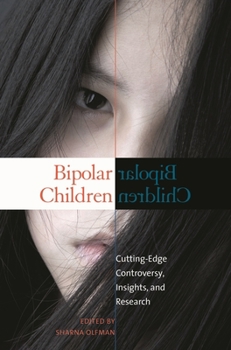Bipolar Children: Cutting-Edge Controversy, Insights, and Research
Select Format
Select Condition 
Book Overview
Over the last decade, the number of children diagnosed with bipolar disorder has increased up to fortyfold. This is a trend exclusive to the United States, and one that, alarmingly, leads to most of the diagnosed children--some still in their infancy--being prescribed antipsychotic drugs, often in combination with anticonvulsants. These classes of drugs have dangerous side effects, including a doubling of mortality rates, shortened life span, extreme...
Format:Hardcover
Language:English
ISBN:0275997308
ISBN13:9780275997304
Release Date:October 2007
Publisher:Praeger
Length:176 Pages
Weight:1.55 lbs.
Dimensions:0.8" x 6.5" x 9.4"
Customer Reviews
2 ratings
Reality of bipolar disorder and children, too often diagnosed
Published by Thriftbooks.com User , 14 years ago
Joel Nigg has a book on ADHD, What Causes ADHD? A similar thought can be considered with bipolar disorder. Most treat bipolar disorder, like it is some brain disorder that rises unbidden in those who have inherit it through genetics. However, there is much evidence that there are causes for both ADHD and bipolar disorder. Many times, depression, or ADHD, treated with medications, can lead to bipolar disorder. Kids today are bombarded with violence on television, movies and video games. The electronic age and fragmented family life has lead to much isolation for millions of children. George Albee, Ph.D., who was a former president of the American Psychological Association pointed to such social stressors as causes of mental illness. He looked down upon prescribing medications for children for psychiatric or perceived psychiatric disorders. He felt, in fact, that children should never be prescribed these strong drugs. Sharna Olfman's panel brings convincing evidence that millions of children are being needlessly prescribed strong medications, and that there is evidence that there is much misdiagnosis in the labeling of children with bipolar disorder. It is a book worth having in your library of giving as a gift for anyone whose child is diagnosed with bipolar disorder. Overcoming ADHD Without Medication: A Parent and Educator's Guidebook
Sick children, or a sick society?
Published by Thriftbooks.com User , 17 years ago
The number of U.S. children diagnosed with bipolar disorder rose an astounding 4,000% in the past ten years. This startling fact drives home the urgency of this important new book edited by Sharna Olfman and bringing together some of the world's most distinguished experts in the field. Each of the book's nine contributors offers a unique perspective on the issue, providing readers with a comprehensive view of a controversial and disturbing subject. Among the most passionate voices are those of Dr. David Healy and Dr. Joanna Le Noury, who dissect the pharmaceutical industry's unscrupulous strategies to expand the psychiatric drug market, resulting in the unprecedented "tidal wave" of child drugging currently sweeping our nation. Award-winning journalist Robert Whitaker writes a carefully documented chapter citing solid scientific evidence showing that the widespread practice of medicating young children with stimulants like Ritalin or antidepressants like Prozac has fueled an explosion of drug side effects including psychosis, mania and suicidal impulses. These drug reactions are then misinterpreted as symptoms of severe mental illness, resulting in a mis-diagnosis of bipolar disorder which leads to treatment with "mood stabilizers" often combined in drug cocktails including major tranquilizers like Risperdal or Seroquel. We may be witnessing a drug-induced epidemic of mental and physical disabilities directly caused by the irresponsible and misguided medical mis-treatment of our nation's children. Psychology professor Daniel Burston looks at what is happening and calls it "the chemical colonization of childhood." Regardless of who or what we choose to blame for causing this catastrophe -- Big Pharma, bad parenting, overcrowded schools, environmental toxins, television violence, etc. -- one thing is certain: nothing will change until DOCTORS stop making the diagnoses and DOCTORS stop writing the prescriptions. What will it take to bring about such a change? Perhaps we should begin focusing less on the children who are diagnosed, and more on the doctors who do the diagnosing. Lawrence Diller writes, "Only economic factors, the threat of legal action, or very negative publicity (e.g., children's deaths while taking antidepressants) have widespread influence on doctors' prescribing practices and treatment." In the book's final chapter, epidemiologist Philip Landrigan sounds the alarm over the growing number of neurotoxic chemicals including mercury that are poisoning our environment. Landrigan writes, "It is striking that the mental health community has virtually ignored the health risks to children growing up in a world that is awash with thousands of synthetic chemicals, hundreds of which are already known to be poisonous to the brain." How ironic, then, if our society's response to the harm caused by environmental toxins is to give our children drugs -- chemical substances that are toxic to growing bodies and vulnerable brains!






